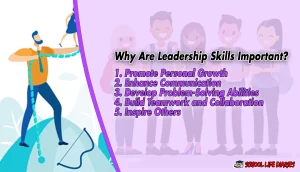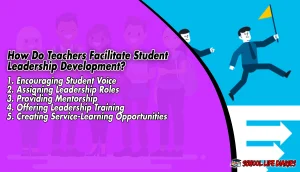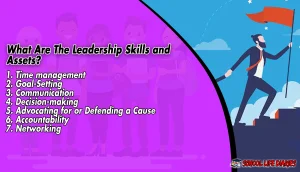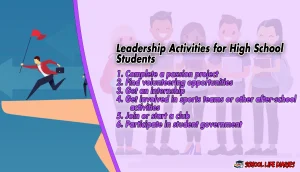Leadership is an essential quality that plays a crucial role in the personal and professional development of individuals. It is not limited to adults or professionals but can also be cultivated among students. Student leadership refers to the ability of students to take initiative, inspire others, and make positive contributions within their school and community.
In this article, we will explore the concept of leadership, discuss the importance of leadership skills, delve into how teachers facilitate student leadership development, highlight the significance of leadership skills for 21st-century learners, identify various leadership skills and assets, and provide tips for high school students to engage in leadership activities.
What Is Leadership?
Leadership is a multifaceted concept that encompasses the ability to guide, influence, and motivate others toward achieving common goals. It involves taking charge, making decisions, and inspiring others to follow. Effective leadership involves a combination of traits, skills, and behaviors that enable individuals to lead and inspire others.
Why Are Leadership Skills Important?
Leadership skills are vital in various aspects of life, both personally and professionally. They empower individuals to navigate challenges, communicate effectively, build relationships, and make a positive impact. Here are some reasons why leadership skills are important:
1. Promote Personal Growth:
Leadership skills contribute to personal growth by fostering self-confidence, self-awareness, and resilience. They encourage individuals to step out of their comfort zones, take risks, and learn from their experiences.
2. Enhance Communication:
Effective leaders possess strong communication skills, enabling them to express their ideas clearly, listen actively, and collaborate with others. These skills are essential in building relationships and resolving conflicts.
3. Develop Problem-Solving Abilities:
Leaders are often faced with complex problems that require critical thinking and analytical skills. By developing these skills, individuals can identify innovative solutions and make informed decisions.
4. Build Teamwork and Collaboration:
Leadership skills promote teamwork and collaboration. Leaders are skilled at bringing diverse individuals together, leveraging their strengths, and fostering a cohesive team environment.
5. Inspire Others:
Strong leaders have the ability to inspire and motivate others to achieve their full potential. They lead by example, set high standards, and encourage others to strive for excellence.
How Do Teachers Facilitate Student Leadership Development?
Teachers play a crucial role in nurturing and developing student leadership. They create an environment that encourages student participation, provides opportunities for growth, and promotes leadership development. Here are some ways teachers facilitate student leadership development:
1. Encouraging Student Voice:
Teachers give students a platform to express their opinions, ideas, and concerns. They create a safe and inclusive space where students feel comfortable sharing their perspectives.
2. Assigning Leadership Roles:
Teachers assign leadership roles within the classroom or school, such as group leaders, project coordinators, or class representatives. These roles allow students to practice and develop their leadership skills.
3. Providing Mentorship:
Teachers serve as mentors and role models for students. They provide guidance, support, and constructive feedback to help students develop their leadership abilities.
4. Offering Leadership Training:
Teachers organize workshops, seminars, or training sessions focused on leadership development. These activities equip students with the necessary skills, knowledge, and strategies to become effective leaders.
5. Creating Service-Learning Opportunities:
Teachers integrate service-learning projects into the curriculum, allowing students to engage in real-life problem-solving and community service. These experiences cultivate leadership skills while making a positive impact on society.
The Importance of Developing Leadership Skills for 21st-Century Learners
In the fast-paced and interconnected world of the 21st century, leadership skills are more important than ever. The evolving landscape requires individuals to adapt, innovate, and collaborate effectively. Here’s why developing leadership skills is crucial for 21st-century learners:
1. Adaptability:
Effective leaders are adaptable and embrace change. They have the ability to navigate uncertainty, think creatively, and find solutions in dynamic environments.
2. Global Citizenship:
Leadership skills foster a sense of global citizenship by promoting cultural competence, empathy, and inclusivity. 21st-century leaders appreciate diverse perspectives and work towards creating a more equitable and sustainable world.
3. Entrepreneurship:
Leadership skills cultivate an entrepreneurial mindset, enabling individuals to identify opportunities, take risks, and turn ideas into action. In today’s rapidly evolving economy, entrepreneurial leadership is highly valued.
4. Digital Literacy:
21st-century leaders must be proficient in using technology and leveraging digital tools. They should be able to communicate, collaborate, and adapt to emerging technologies effectively.
5. Collaboration:
Collaboration is essential in the 21st century, as complex problems often require a collective effort. Leadership skills promote effective teamwork, interdisciplinary collaboration, and the ability to build networks.
What Are The Leadership Skills and Assets?
Leadership skills encompass a range of abilities and assets that contribute to effective leadership. Here are some key leadership skills and assets:
1. Time management:
Effective leaders understand the value of time and possess strong time management skills. They prioritize tasks, set goals, and allocate their time efficiently to achieve desired outcomes.
2. Goal-Setting:
Leadership involves setting clear goals and guiding others toward their accomplishment. Leaders define objectives, create action plans, and monitor progress to ensure the goals are achieved.
3. Communication:
Strong communication skills are fundamental to leadership. Leaders express their ideas clearly, listen actively, provide feedback, and adapt their communication style to different audiences.
4. Decision-making:
Leaders are skilled at making informed decisions. They gather relevant information, analyze alternatives, consider the consequences, and make choices that align with the team’s goals and values.
5. Advocating for or Defending a Cause:
Leaders have the ability to advocate for causes they believe in and defend their ideas or opinions. They use persuasive communication and influence to rally support and create positive change.
6. Accountability:
Leaders take responsibility for their actions and decisions. They hold themselves and others accountable for their performance, ensuring that commitments are met and expectations are fulfilled.
7. Networking:
Leaders build networks and establish connections with diverse individuals. Networking allows leaders to gain support, access resources, and collaborate with others to achieve common goals.
Leadership Activities for High School Students
Engaging in leadership activities during high school can significantly contribute to personal growth and future success. Here are some leadership activities for high school students:
1. Complete a passion project:
Identify a cause or topic that you are passionate about and initiate a project to create a positive impact. It could be organizing a fundraising event, launching an awareness campaign, or starting a community service initiative.
2. Find volunteering opportunities:
Volunteering provides valuable opportunities to develop leadership skills while giving back to the community. Explore local organizations or non-profits that align with your interests and offer volunteer positions.
3. Get an internship:
Internships allow students to gain practical experience in a specific field or industry. Seek out internships that offer leadership responsibilities, as they provide valuable insights into professional leadership roles.
4. Get involved in sports teams or other after-school activities:
Participating in sports teams or extracurricular activities provides opportunities to develop teamwork, communication, and leadership skills. Join clubs, student organizations, or teams that align with your interests.
5. Join or start a club:
Join an existing club or start a new one centered around a specific interest or cause. Clubs provide platforms for students to collaborate, organize events, and develop leadership abilities.
6. Participate in student government:
Student government offers a direct opportunity to lead and represent your peers. Run for a position, contribute ideas, and engage in decision-making processes that shape the school environment. By actively participating in these activities, high school students can develop and refine their leadership skills while making a positive impact on their communities.
FAQs:
Q: How can students develop leadership skills?
A: Students can develop leadership skills by engaging in activities such as volunteering, joining clubs, participating in student government, and pursuing internships. These experiences provide opportunities to practice leadership, collaborate with others, and develop essential skills.
Q: Are leadership skills only beneficial for future careers?
A: No, leadership skills are valuable in various aspects of life, not just for future careers. They help individuals become effective communicators, problem-solvers, and collaborators, which are essential for personal growth, relationships, and community involvement.
Q: Can leadership skills be learned or are they innate?
A: While some individuals may naturally possess certain leadership qualities, leadership skills can be learned and developed over time. Through practice, guidance, and self-reflection, anyone can enhance their leadership abilities.
Q: How do leadership activities benefit high school students?
A: Leadership activities benefit high school students by fostering personal growth, developing essential skills, providing networking opportunities, and demonstrating initiative and responsibility, which can enhance college applications and future career prospects.
Q: Are there any online resources or courses available for developing leadership skills?
A: Yes, there are several online resources, courses, and programs available that focus on developing leadership skills. Platforms like Coursera, edX, and LinkedIn Learning offer courses specifically designed to enhance leadership abilities.
Q: Can introverted students become effective leaders?
A: Absolutely! Introverted students can become effective leaders by leveraging their strengths, such as active listening, thoughtful decision-making, and building strong relationships. Leadership is not limited to extroverted individuals, and diverse leadership styles are valuable.
Conclusion:
Leadership as a student plays a crucial role in personal development, fostering essential skills, and preparing for future endeavors. By understanding the concept of leadership, recognizing the importance of leadership skills, and actively engaging in various leadership activities, high school students can unlock their potential and make a positive impact in their communities.
Whether it’s through passion projects, volunteering, internships, or involvement in clubs and student government, students can cultivate leadership skills that will benefit them throughout their lives. Embrace the opportunities available, strive for growth, and become a leader who inspires positive change.









